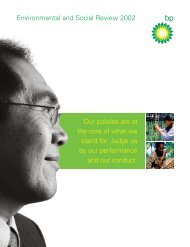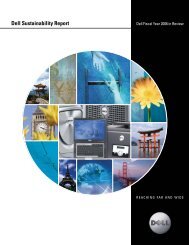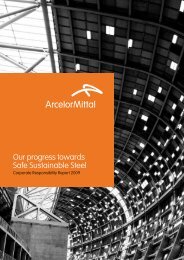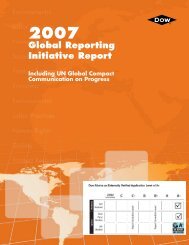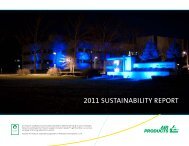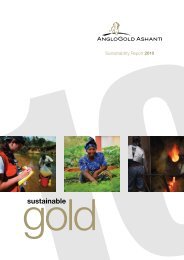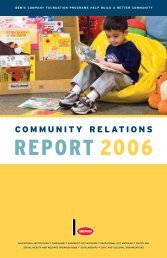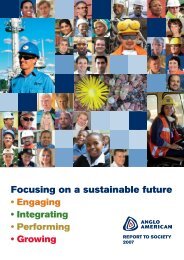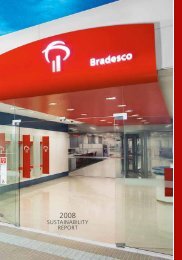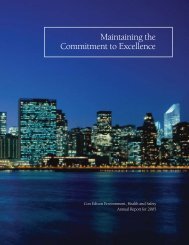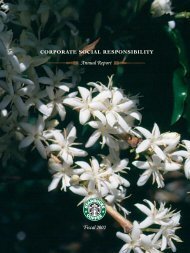Blueprint for Sustainability - Corporate - Ford Motor Company
Blueprint for Sustainability - Corporate - Ford Motor Company
Blueprint for Sustainability - Corporate - Ford Motor Company
- No tags were found...
You also want an ePaper? Increase the reach of your titles
YUMPU automatically turns print PDFs into web optimized ePapers that Google loves.
HUMAN RIGHTS 31Setting Expectations <strong>for</strong> Our Suppliers<strong>Ford</strong>’s Global Terms and Conditions – our core contract coveringall suppliers – reflect our prohibition of the use of <strong>for</strong>ced labor,child labor and physical disciplinary abuse. These requirementswere added in January 2004 <strong>for</strong> production suppliers and inSeptember 2005 <strong>for</strong> all others. We have provided a standard <strong>for</strong>these areas – the same as we use in our own facilities – thatsupersedes local law if our standard is more stringent. TheGlobal Terms and Conditions also prohibit any practice inviolation of local laws.Building Supplier CapabilityThe primary focus of our work on human rights in our supplychain is building capability among our suppliers to responsiblymanage working conditions. This includes meeting legalrequirements and <strong>Ford</strong>’s expectations and promoting soundworking conditions in their own supply chains. We havedeveloped and delivered tailored training programs <strong>for</strong> <strong>Ford</strong>suppliers in select countries in cooperation with the AutomotiveIndustry Action Group, a North American member-based,nonprofit industry group specializing in supply chain issues.The training workshops emphasize the interpretation andapplication of legal standards and international best practice. Byinteracting with managers from the Human Resources, Healthand Safety, Labor Affairs and Legal departments of participatingcompanies, the workshops provide <strong>for</strong> a two-way learningexperience touching on the areas of interest <strong>for</strong> each company.While <strong>Ford</strong>’s supplier training sessions are customized to alignwith the unique laws, customs, cultures and needs of eachlocation, in general they consist of:A daylong interactive workshop with specialized <strong>Ford</strong> trainersand other automotive suppliers in which participants developand confirm an understanding of <strong>Ford</strong> expectations, locallabor law, best practices and management systems, andA confirmed communication cascade, including in<strong>for</strong>mationobtained during the classroom training, to all supplierpersonnel and direct sub-tier suppliers.During 2007, we held training workshops in Brazil, China,Colombia, Mexico, South Africa, Thailand, Turkey and Venezuela.Some 1,528 managers from 1,225 different supplier companieshave completed a full day of training since the inception of theprogram in 2004. These suppliers have now moved on to theprocess of self-assessing their facilities <strong>for</strong> compliance with locallaw and <strong>Ford</strong> expectations, and completing the final stage of theprogram, which is communication to both personnel and theirown suppliers on the topic of working conditions expectations.We continue to focus on the 17 countries we had previouslyidentified as having higher risks of substandard workingconditions. (See Figure 1, page 32.) Among those countries,locations are prioritized based on production and sourcingtrends, sales trends, and relative perceived risk based on theinput of human rights groups, other companies’ experience andother geopolitical analysis.Assessing SuppliersSince 2003, we have conducted more than 400 assessmentsof existing and prospective suppliers in 16 countries. Theassessments provide feedback to <strong>Ford</strong> and suppliers abouthow well they are meeting legal requirements and <strong>Ford</strong>’sexpectations. They also provide insight into the effectivenessof our training programs. Assessments consist of a detailedquestionnaire, a document review, factory visits, andmanagement and employee interviews, and are conducted withthe assistance of external auditors.In 2007, we conducted assessments in Brazil, China, Colombia,India, Malaysia, Mexico, Romania, Russia, South Africa, Taiwan,Thailand, Turkey and Venezuela. The findings from theassessments in 2007 were generally consistent with those wehad previously conducted. Namely, they identified a wide rangeof general health and safety issues, several wages and benefitsissues and a limited number of other types of noncompliance.The findings from <strong>Ford</strong>’s 2007 supplier assessments included:No evidence of <strong>for</strong>ced labor or physical disciplinary abuseA range of general health and safety issues, includinginadequate emergency systemsIn some cases, a lack of appropriate timekeeping systems,and thus a failure to pay correct overtime wagesIn some cases, a failure to pay the correct local minimumwage or overtime or to provide the correct social insuranceA general need to clearly define policy on harassment anddiscriminationLimited cases of restricted workers doing hazardous workIn some cases, limited or restricted access to appropriatedocumentation regarding subcontracted labor and privacypoliciesIn some cases, nonpayment of company contributions togovernment-mandated social programsIn addition, freedom of association has been difficult to verify.While all assessed suppliers have either union representatives ora grievance process, there may be issues we have not beenable to identify through our assessment process.We continue to engage with our suppliers to develop andimplement appropriate corrective action plans. In this manner,we also have an opportunity to encourage change throughoutthe tiers of suppliers and affect positive change more broadly.Measuring Per<strong>for</strong>manceWe recognize the need to communicate per<strong>for</strong>mance resultsand strive to do so in a meaningful way. We have taken steps tobetter align the data we provide with that used elsewhere in thecompany, to ensure it is useful and accessible to people withinour business and within our suppliers’ businesses. While wehave made progress developing – and remain committed to – adata tracking and reporting system, we are also looking <strong>for</strong> waysto streamline the data-collection process, targeting thoseindicators that are of highest value to us and our stakeholders.(See Table 1, page 32.)INTRODUCTION GOVERNANCE CLIMATE CHANGE MOBILITY HUMAN RIGHTS VEHICLE SAFETY SUSTAINING FORD CONCLUSIONFor more in<strong>for</strong>mation visit:www.<strong>for</strong>d.com/go/sustainability



